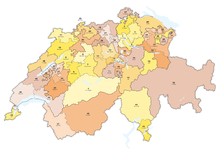1908 Swiss federal election
Federal elections were held in Switzerland on 29 October 1908. The Free Democratic Party retained its majority in the National Council.[1]
.svg.png) |
|---|
| This article is part of a series on the politics and government of Switzerland |
|
|

The 49 electoral districts
Electoral system
The 167 members of the National Council were elected in 49 single- and multi-member constituencies using a three-round system. Candidates had to receive a majority in the first or second round to be elected; if it went to a third round, only a plurality was required. Voters could cast as many votes as there were seats in their constituency.[2] There was one seat for every 20,000 citizens, with seats allocated to cantons in proportion to their population.[2]
Results
Voter turnout was highest in Aargau at 83.1% (higher than the 80% in Schaffhausen, where voting was compulsory) and lowest in Zug at 16.1%.
| Party | Votes | % | Seats | +/– |
|---|---|---|---|---|
| Free Democratic Party | 202,732 | 50.9 | 105 | +1 |
| Catholic People's Party | 81,733 | 20.5 | 34 | –1 |
| Social Democratic Party | 70,003 | 17.6 | 7 | +5 |
| Liberal Centre | 23,597 | 5.9 | 16 | –3 |
| Democratic Group | 14,414 | 3.6 | 5 | –1 |
| Others | 5,745 | 1.4 | 0 | 0 |
| Invalid/blank votes | 28,528 | – | – | – |
| Total | 426,752 | 100 | 167 | 0 |
| Registered voters/turnout | 809,508 | 52.7 | – | – |
| Source: Mackie & Rose,[3] BFS (seats) | ||||
gollark: At least use Zig, which is cool and mildly safe.
gollark: Repeatedly. Over and over again. A better approach is needed.
gollark: People "know" how to avoid memory bugs AND THEY KEEP DOING IT.
gollark: Many things which "work" use C and then turn out to have 129047124 security vulnerabilities.
gollark: You know I can't tell you that for another 3.6Ms.
References
- Elections to the National Council 1848–1917: Distribution of seats by party or political orientation Archived 2015-09-23 at the Wayback Machine BFS
- Dieter Nohlen & Philip Stöver (2010) Elections in Europe: A data handbook, p1886 ISBN 9783832956097
- Thomas T Mackie & Richard Rose (1991) The International Almanac of Electoral History, Macmillan
This article is issued from Wikipedia. The text is licensed under Creative Commons - Attribution - Sharealike. Additional terms may apply for the media files.